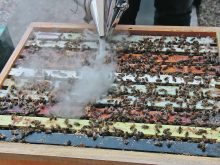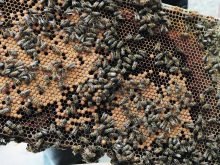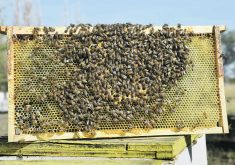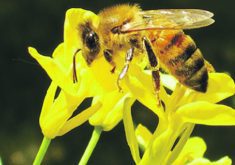A list of antimicrobials given to livestock will be available next year only with a prescription.
Canadian farmers who raise cattle, hogs, sheep and poultry are gearing up for the change, but the beekeeping industry isn’t ready for the new rules.
That’s because most veterinarians in Canada don’t have the knowledge or training to write prescriptions for bees, said Rod Scarlett, executive director of the Canadian Honey Council.
It’s difficult to estimate how many vets in Canada are qualified to treat bees, but the number could be less than a dozen.
Read Also

Ag in Motion innovation awards showcase top 2025 ag technology
The 2025 Ag in Motion Innovation Awards celebrated winners across five categories: agronomics, agtech, business solutions, environmental sustainability and equipment.
“I have heard (that) 10 would be willing to prescribe to bees,” Scarlett said.
That’s a problem because there are thousands of commercial and hobbyist apiarists in Canada.
Many of those beekeepers dose their hives with antibiotics to prevent American foulbrood, a bacterial disease.
“Antibiotics are the standard, preventative method,” Scarlett said.
“American foulbrood is (universal) in every bee. The drugs don’t destroy the spores, it manages them.”
The Canadian Veterinary Medical Association said last month that as of Dec. 1, 2018, all medically important microbials for veterinary use will be sold by prescription only. Antibiotics are the most recognizable antimicrobial drug but livestock are also given anti-virals, anti-fungals and anti-parasitics.
In an effort to curb antimicrobial resistance, Health Canada is adopting a system that includes veterinary oversight of antimicrobials.
A document on Health Canada’s website says overuse and misuse of antibiotics in humans and livestock can cause antibiotic resistance.
Scarlett said bees were caught up in the regulations because honeybees are often classified as livestock.
Few Canadians would think of bees as livestock because there are many differences between raising cattle and raising bees. One of the differences is the use of veterinary medicine. Almost all cattle producers in Canada have a relationship with their local vet, but few, if any, beekeepers work closely with a vet.
Scarlett said large commercial beekeepers may be able to find a vet willing to write an antibiotic prescription. However, it will be more challenging for beekeepers who have two or three hives.
“I’m not sure that veterinary clinics, anywhere, are prepared for any of this. There are 3,000 beekeepers in the Toronto area alone,” he said.
“How do we control and allow access to these products (antimicrobials) with the dog and cat vet at the end of the street?”
The honey council considered asking for an exemption for beekeepers but ruled that out because antimicrobial resistance is a Health Canada priority.
“We know this whole antimicrobial concern is valid,” Scarlett said.
“So what we asked is at least for some discussion on a period where we can get veterinarians familiar with beekeeping problems.”
He said it’s unrealistic to train and educate vets about bee colonies and diseases that affect bees by Dec. 1, 2018, so the industry needs an extension or a phase-in period to adjust to the new rules.
Beekeepers use two antibiotics, ox tetracycline and tylosin, to treat American foulbrood. Another, lincomycin, will soon be registered.
All three will require a prescription under the new rules.
Contact robert.arnason@producer.com


















